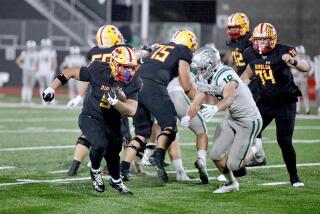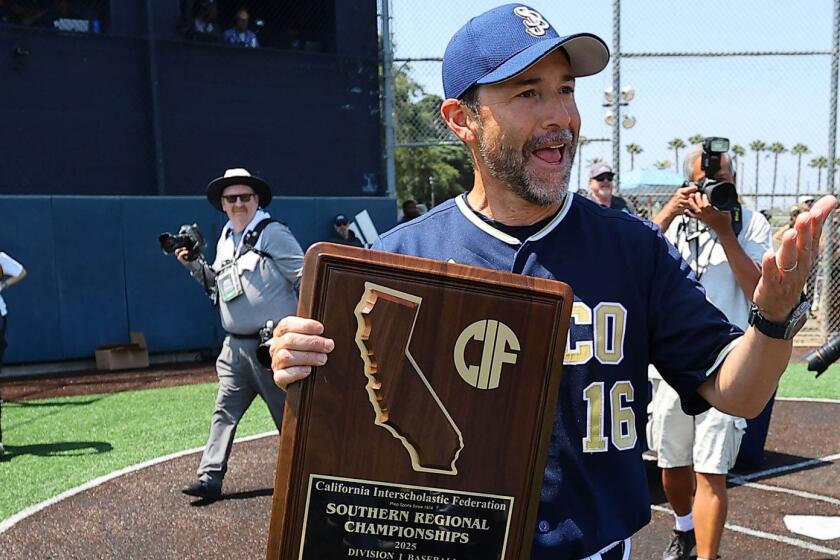Colleges Are Moving In on Friday Night Lights
- Share via
Fresno State is 6-0, ranked No. 8 in the nation and expected to win easily, but Coach Pat Hill does not want to play Boise State tonight.
Hill believes Friday nights should be reserved for high school football, and he’s not alone. The Fresno faithful love their Bulldogs--but even more when they stick to playing on Saturdays.
Also tonight, about 10 miles from Fresno State’s stadium, Clovis West and Fresno Buchanan highs will play before a crowd expected to fall considerably short of the usual 8,000.
Buchanan Coach Jim Moxley is a Bulldog fan, but he doesn’t like the conflict. He says people have called the school and asked if the high school game can be moved. “When we say no,” he said, “they ask why not.”
Hill, whose son will be playing for Clovis West, doesn’t like it, either. “I really don’t want to play [tonight],” he said. “ ... But we have a great chance here for exposure.”
The Fresno-Boise State game is being nationally televised by ESPN, part of the network’s experiment to capture a Friday night market share, and it’s the only game on the schedule.
Teams like Fresno State, which plays in the lowly Western Athletic Conference, crave such a spotlight. But with opening kickoff at 5 p.m. and most of the local high school games starting at 7:30, there’s not much wiggle room for fans who would like to see both.The NCAA cleared the way for Friday night football this season when it repealed a rule from the 1950s that banned televising college games on Fridays. ESPN jumped at the chance to duplicate a format comparable to the niche it created when it started televising Thursday night games in 1991.
Tonight’s game is the second on Friday night this season. There was supposed to be another, but a backlash from high school fans and coaches in Ohio forced the rescheduling of the Toledo-Minnesota game that was on ESPN’s schedule for Aug. 31.
Caught between outraged locals and the upside of a national TV night all to themselves--the Rockets were 10-1 last season and still not invited to a bowl game--Toledo moved the game.
The final straw might have been a letter received by a Toledo coach. The university sends out annual questionnaires to local high school coaches about possible prospects. One was returned in shreds, with a note attached: “If you play on Friday nights, I don’t want my players going to Toledo.”
High school coaches in Minnesota were also upset, causing Gopher Coach Glen Mason to write soothing letters to football coaches throughout the state.
When the game was moved to Thursday, ESPN did not televise it. But the high school fans in both markets was satisfied. “They appreciated the gesture,” said Paul Helgren, spokesman for the Toledo athletic program.
Nevada Las Vegas faced a smaller backlash when it kicked off ESPN’s Friday night format with a home game against Northwestern on Sept. 7.
Local reporters were critical, as were some local coaches who felt the sanctity of high school football had been disturbed.
But UNLV, a Mountain West Conference team that was expecting a solid season under third-year Coach John Robinson, had not been on ESPN since the 1994 Las Vegas Bowl.
“We need to play on Friday,” Robinson said beforehand. “We have the opportunity for national exposure. Our program needs it.”
UNLV lost, 37-28, and has struggled to a 2-4 start.
For major-college programs, playing on Friday night isn’t an issue because they need not battle for publicity. UCLA Coach Bob Toledo is among the many who say college football should be played only on Saturdays. “I guess people want more money, more exposure,” he said. “Whatever they want, I’m not in favor of it. It’s getting out of hand.”
Of course, Toledo and coaches of other ranked teams can afford to think that way.
The American Football Coaches Assn. also has come out strongly against Friday night college football. A mouthpiece for national college coaches, the AFCA has lobbied against the concept since it was unveiled in May.
A statement by the AFCA at the time issued a warning to conference commissioners and university officials who agreed to play such games.
“High school football in America needs support from the NCAA and other entities, not the distraction Friday night college football will bring,” the statement said.
Four months later, AFCA executive director Grant Teaff, a former coach at Baylor, is still waggling his finger.
“One of the things I learned a long time ago is that if we don’t have good strong high school programs, we have no football at all on the college level,” Teaff said. “If Friday football games hurt high school football, and I personally believe they do, they should not be done. I’m hopeful that by the beginning of next year, we won’t have any games [on Friday nights].”
ESPN has not committed to Friday night football next year.
The Northwestern-UNLV game drew a 1.8 rating, a number that was “certainly very good for us,” ESPN spokesman Mike Soltys said, pointing out that Friday night TV audiences are tough to reach in general.
The format “is something we’ve experimented on this year,” Soltys said. “We’ll evaluate it at the end of the year.”
But for many high school coaches, the verdict is in.
“I’d rather they try and not play on Fridays,” Fresno Edison Coach Ray Reyes said. “I think college football would be fine without it.”
More to Read
Get our high school sports newsletter
Prep Rally is devoted to the SoCal high school sports experience, bringing you scores, stories and a behind-the-scenes look at what makes prep sports so popular.
You may occasionally receive promotional content from the Los Angeles Times.







